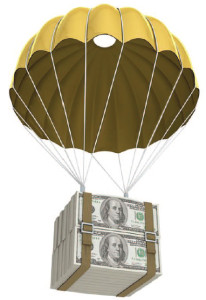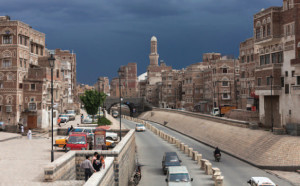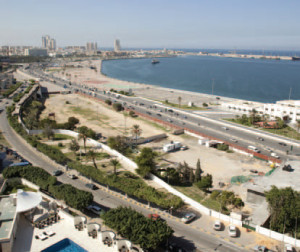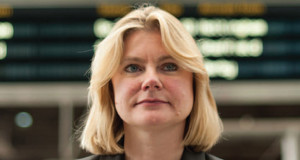 The Arab Spring countries are said to need billions of dollars to see them through “transition”. MUSHTAK PARKER looks at international efforts to help them
The Arab Spring countries are said to need billions of dollars to see them through “transition”. MUSHTAK PARKER looks at international efforts to help them
No-one really knows how much financing is required to fund recovery and reconstruction in the so-called Arab Spring countries, euphemistically known by governments and multilateral development agencies as “countries in transition”.
The countries in question – Egypt, Jordan, Libya, Morocco, Tunisia and Yemen, all with huge structural economic and financial problems – maintain that they need billions of dollars in assistance to help them through this crucial transition towards a more democratic and accountable political and economic dispensation.
Failing this, it’s believed that they risk being embroiled in continuing political instability underpinned by a dysfunctional economy highlighted by an increasing gap between the rich and the poor; burgeoning adult unemployment, especially male; massive youth joblessness;
fewer opportunities for women in the workplace; and growing alienation, especially amongst the young, with the political system that, it’s felt, could turn some of them towards radicalisation.
Not surprisingly, the Group of Eight (G8) industrialised nations during the 2011 G8 Summit in Deauville endorsed and launched a framework called The Deauville Partnership to support transition countries in MENA in governance; social and economic inclusion; economic modernisation and job creation; private-sector-led growth; and regional and global integration.
Apart from bilateral aid and development programmes, the core thrust of The Deauville Partnership is for the private sector – both international financial institutions (IFIs) and corporates – to engage with partners and counterparties internationally, regionally and in the transition countries themselves to start delivering the foregoing objectives.
The G8 finance ministers’ meeting in Marseille, in 2011, in this context also established the G8 Deauville Partnership IFI Coordination Platform under the UK G8 presidency. The platform was set up “to facilitate joint operations and maximize synergies among institutions in the region”.
The Secretariat of the G8 Deauville Partnership IFI Coordination Platform for 2013 is held by the Jeddah-based Islamic Development Bank (IDB) Group, the multilateral development bank (MDB) of the Muslim world, which has a subscribed capital of $75bn, the largest of any of the peer MDBs, including the World Bank Group and the Asian Development Bank.
In the wake of recent developments in Egypt, Tunisia and Libya especially, the UK Foreign and Commonwealth Office (FCO), under the UK G8 presidency, held the G8 Deauville Partnership with Arab Countries in Transition Investment Conference in London in September, in partnership with the European Bank for Reconstruction and Development (EBRD) and the IDB Group, to highlight “opportunities and overcoming challenges in Arab countries in transition”.
Critics of the Deauville Process emphasise that its approach is too piecemeal, concentrating too much on technical assistance and mentoring, and lacks urgency, cohesion and direction, especially at a time when the transition countries are faced with renewed governance challenges.
The president of the Islamic Development Bank (IDB), Dr Ahmad Mohamed Ali, for instance, has called on the international community to come up with a concrete Special Programme for Recovery in the Arab Spring countries and pledged the continued support and cooperation of the IDB Group in such an initiative.
Dr Ali, who attended the G8 Deauville Partnership with Arab Countries in Transition Investment Conference in London, explained in an interview that: “It is important for members of the Deauville Partnership not to confine themselves only to technical assistance. At the same time, official aid is not enough. What we need is a Special Programme for Recovery and Reconstruction. We appreciate that many of the G8 countries are faced with economic problems of their own in the aftermath of the on-going global financial crisis. But we have to do more.”
The G8 Deauville Partnership IFI Coordination Platform objectives include information sharing and coordination of activities among IFIs; proactive identification of joint projects, policy and analytical work; regular development of knowledge products; and regular monitoring and reporting on joint-operations in the region.
The tasks and challenges of the socio-economic transformation of the Arab countries in transition cannot be underestimated. Transition, as Dr Ali maintains, is never an easy process “because we have to move from what we know to something that is by definition less familiar. It is often said that the road to harmony is not without birth pangs.
“The Arab countries in transition are fortunate for two reasons. First, recent 20th century history has provided us with a template for successfully managing the transition process, as witnessed, for example, in Eastern Europe and throughout many parts of Asia. Secondly, the Arab countries in transition are being supported by a formidable consortium of donor countries and international financial institutions.”
Indeed, according to Dr Ali, since 2011, IFIs have collectively committed in excess of $23bn of assistance to the Arab countries in transition, including $5.8bn from the IDB Group, in addition to billions of dollars of bilateral assistance from Gulf countries, Turkey and the G8. “However, as important as official aid may be, it is not enough to transform the economies of Arab countries in transition. We also need the private sector, which is the real engine of growth,” he said.
Alistair Burt, Minister of State for the MENA Countries at the FCO, also spelt out the realities of both the policy and financing challenges in no uncertain terms. “We know – from listening to the region – that one of the greatest challenges faced by the transition countries is responding to their people’s demand for economic opportunity. To meet that demand, forty million jobs will need to be created across the Middle East and North Africa during the next decade.
“We also know that the private sector will be critical in fuelling the growth that is needed to create those jobs. Business is already playing a bigger role than it ever has before, but that role must grow larger if it is to become the source of jobs that we, and the people, need it to be. That is why increasing inward investment is so critical to the region’s future,” he emphasised at the Deauville Investment Conference.
Dr Ali, who had talks with the minister and his colleague Alan Duncan, UK Minister for International Development, agreed that it was difficult to assess how much funds were required for recovery in the Arab countries in transition. Syria, given the on-going conflict, to him is completely off the radar at the moment.
“We should send a clear message to the people of the region that, despite these difficult times there is still hope. We are optimistic this message will reach the people and our effort here in London will help the region. A more serious problem is Syria. I told ministers that people in the region are not happy with the situation. People are not happy that children, women and men are people killed everyday with all types of weapons used. They are not happy with the suffering and the fact that most of schools in the country are destroyed. The situation is bleak indeed,” he maintained.
Dr Ali confirmed that all Arab transition countries are priorities for the bank and wherever the bank has a chance to act it will do so. “If we have a chance,” he added, “we will not hesitate to help. Syria, of course, is vital but we don’t have access to Syria while the current conflict is going on. The common theme that has emerged in my discussions with these countries is that they give us a lot of infrastructure projects mainly for areas neglected in the past. These are the least developed areas in the countries.
“We have suggested this to the Deauville Partnership IFI Coordination Group, which has subsequently visited Tunisia for instance and identified projects worth $3.2bn in which the IDB Group is also participating.”
In Libya, the emphasis is on the creation of jobs especially for those youths who were under arms; and developing the Islamic banking industry. The IDB, he pledged, will participate in the equity if the Libyans decide to launch an Islamic bank.
Last year, the IDB also established a $250m emergency fund for Egypt and Tunisia to facilitate projects aimed at generating youth employment. Most of this fund, confirmed Dr Ali, has now been committed to such projects. He, however, agreed that the challenge of youth unemployment remains a major one and that the bank will commit more funds as and when projects are identified and developed.
The IDB Group envisages achieving its own and the Deauville Coordination Group objectives through providing transition countries with the opportunity to present their investment policies and ongoing reforms to remove barriers to FDI and to showcase their investment sectors.
The ultimate objective of building such an enabling investment environment in the transition countries is to provide more confidence to local and foreign investors and provide better market access to those countries. The renewed investment and availing of available investment opportunities will support economic and social development and will create more job opportunities, particularly for the young.
In return, Dr Ali made it clear that it is “most important for the transition countries to have national conciliation and leaders who have an understanding to solve problems. These countries can’t afford to have internal disputes and conflict”.
In recent months, Dr Ali has visited Tunisia, Egypt, Yemen, Morocco and Libya. The IDB also organised two follow-up investment regional conferences with its Deauville IFI partners in Tunisia and Egypt in June. Similar conferences are being planned in Morocco and Jordan and, later on, in Yemen and Libya.
 In Tunis, Dr Ali signed an agreement with the Tunisian government whereby the bank will provide up to $1.2bn to the country in ordinary financing (outside the Deauville Process) to finance development projects for the next three years. The IDB is also finalising an agreement with Tunisia on its unique Member Country Partnership Strategy (MCPS), whereby the IDB constitutes a modern action plan under which the bank enters into agreements with member countries for co-operation in priority areas based on a planned programme.
In Tunis, Dr Ali signed an agreement with the Tunisian government whereby the bank will provide up to $1.2bn to the country in ordinary financing (outside the Deauville Process) to finance development projects for the next three years. The IDB is also finalising an agreement with Tunisia on its unique Member Country Partnership Strategy (MCPS), whereby the IDB constitutes a modern action plan under which the bank enters into agreements with member countries for co-operation in priority areas based on a planned programme.
One instrument that is fast emerging as an ideal one to finance infrastructure and development in transition countries is the Sukuk (Islamic trusts certificates). To further assist developing countries, including the transition ones, the IDB is offering to  guarantee Sukuk issuances by sovereigns. During a visit to Tunisia earlier this year, Dr Ali announced that the IDB was willing to guarantee a sovereign Sukuk issuance by Tunisia. Similarly, Egypt is also considering issuing a debut sovereign Sukuk, following the adoption of the country’s Sukuk law earlier this year.
guarantee Sukuk issuances by sovereigns. During a visit to Tunisia earlier this year, Dr Ali announced that the IDB was willing to guarantee a sovereign Sukuk issuance by Tunisia. Similarly, Egypt is also considering issuing a debut sovereign Sukuk, following the adoption of the country’s Sukuk law earlier this year.
Unfortunately, despite this guarantee, both the Tunisian and Egyptian governments have yet to make a formal application to take up this offer and to issue a sovereign Sukuk. The credit enhancement will come from the Sukuk Insurance Policy, which has been developed and introduced by the IDB’s multilateral export credit agency, the Islamic Corporation for the Insurance of Export Credits and Investment (ICIEC). Dr Ali recognises that such a development is important especially to expand the universe of sovereign Sukuk issuers, particularly from non-traditional markets.
Another manifestation of the growing ties between the IDB and Tunis is the fact that Tunisian Prime Minister Ali Larayedh actually attended the meeting of the board of executive directors of the IDB held at its headquarters in Jeddah in July 2013.
The transition experience of other regions has demonstrated that transition countries were still able to attract foreign direct investments (FDI) irrespective of their assessed level of risk. This is the case because investors believe that the accession process is too big to fail, and also because there are tools and products that some IFIs and the private sectors offer to mitigate political and investment risks.
In fact, according to the ICIEC, which is also a partner in the Deauville IFI Platform, the continued uncertainty in the Arab Spring countries and the turmoil in the Mashreq region have contributed to a dramatic rise in the political or investment risk insurance (PRI) business in Fiscal year 2012 and in first half 2013 of the corporation.
In 2012, ICIEC’s PRI programme totalled at a record high of $825m, but in 2013 this figure together with business insured and premium income according to ICIEC CEO, Dr Abdul Rahman Taha, are all set to increase year-on-year by up to 20 per cent, indicating greater demand for such products. In fact, ICIEC is increasing the capacity of and focus on these products by partnering with international reinsurance majors.
Dr Abdel Rahman, also in London for the Deauville Investment Conference, attributed this increase in the corporation’s PRI business as “a testament to the increased awareness of the importance of involving multilaterals such as the ICIEC in new investment programmes. A significant part of this increase in the PRI numbers can also be attributed to the growing relationship ICIEC is building with the multilateral investment guarantee agency of the World Bank (MIGA), which views ICIEC as a strategic reinsurance partner in its member countries”.
Deauville IFI Partnership members emphasise that introducing the right and sound investment policies is beneficial both to growth and development. Sound investment policy-making allow countries, particularly those who are going through transition, to attract more foreign direct investment and, at the same time, protect the rights of investors while ensuring lasting development gains from such investment inflows.
“We, in the IDB Group, are pleased to note that the concerned six Arab governments have started to prepare the ground and have begun to put in place the necessary legal frameworks for creating enabling business environments for foreign direct investment,” said Dr Ali.
In the case of Tunisia, this progress seems to be real, albeit painstakingly slow. According to Tunisian Minister of Finance Elyes FakhFakh, for instance, despite the “exceptional circumstances”, the volume of FDI rose in 2012 compared with 2011.
“This increase,” he said, “is an important indicator of the continued and renewed confidence that our country enjoys among investors and their trust in the ability of Tunisia to overcome this transitional period at a steady pace. The Tunisian government has started reviewing the legal and institutional frameworks for internal and external investment in order to improve the business climate.”
Another important partner of the IDB and in the Deauville Process is the UK’s Department of International Development (DIFID), which co-operates with the EBRD and the IDB in co-financing several initiatives, including supporting the role of women in development in Arab countries.

conference in London, highlighting some of the initiatives that Britain has established or is funding on their behalf
At a recent Arab Women’s Conference in London organised under the UK G8 Deauville presidency, UK Secretary of State for DIFID, Justine Greening, highlighted some of the recent initiatives the UK had established or is funding.
These include:
- The Al Fanar Project in Egypt, which is working to support widowed women establish businesses and to overcome real legal and financial obstacles
- Mercy Corps in Tunisia, which provides vocational training for 2,500 young people – 60 per cent of whom are under 35
- the establishment of FORSA, a new Deauville Partnership enterprise mentoring programme that will support at least 250 entrepreneurs from the transition countries, half of whom are expected to be women
- supporting business development services, and asking them to focus on women entrepreneurs
- with DFID’s support, the European Bank for Reconstruction and Development has partnered with Egypt’s Social Fund for Development to provide various services
- DFID is extending credit to women-owned businesses through supporting EBRD, and a World Bank/IFC Micro and Small and Medium Enterprise (MSMEs) Finance Facility, which develops financial products for women who would otherwise be excluded.
DIFID Secretary Justine Greening told the conference that the agenda outlined “requires us to do more, if Arab women are going to be in a position to compete regionally and globally”. Indeed, in London recently, she also announced the establishment of the Challenge Fund for Arab Women in Business aimed at improving the competitiveness of women entrepreneurs and access to decent jobs.
“The Challenge Fund will co-fund with the private sector practical projects that are both commercially viable and which have a positive economic impact on women. DFID will make an initial contribution of £4m and we want to invite donors and international partners to join us. The Challenge Fund will be open for business in early 2014,” she explained.
In addition, the UK will also provide direct technical assistance to governments to support legal and regulatory reforms aimed at improving women’s economic participation.
“By working directly with governments, we want to help remove some of these barriers to unlock women’s economic potential. As an example of practical action, I want to see the Deauville Partnership establish a task force of experts who can report to leaders on the key legislative barriers to women’s economic participation. Their report could outline clear policies which governments can address with donor support.”
The ultimate challenge for the Arab Spring countries and their international partners is the scaling up of the various initiatives towards achieving a higher and sustainable growth path. For the transition countries, this means the adoption of appropriately supportive macroeconomic policy to smooth adjustment to that higher growth path.
UK DIFID Minister of State Alan Duncan called on the IFIs to “work together to create a massive, overarching scaling up, drawing on our collective convening power, financial and technical capacity, our relationships with partners, and our reputational capital. Working separately we can do much. Working together, we can help the Deauville Partnership countries successful transition to stable, inclusive, growing economies.
“In return, the transition countries need to continue the path of bold reforms so that open, inclusive, economic growth can take root, so that jobs can be created and that good and pluralistic governance can form the basis for the future”.
 Cash And Trade Magazine For Cash and Trade professionals in the Middle East
Cash And Trade Magazine For Cash and Trade professionals in the Middle East




